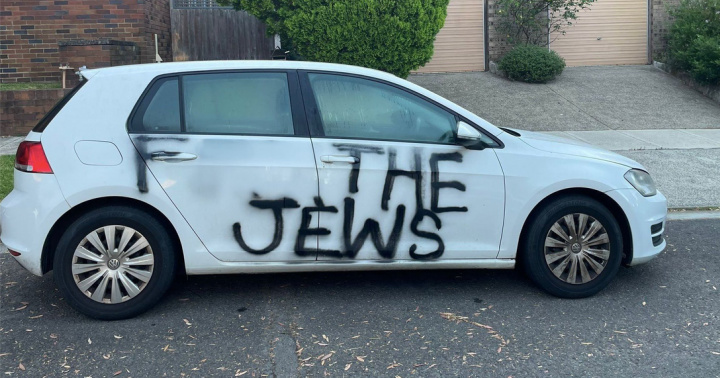Car in New South Wales, Australia graffitied with antisemitic message. The word “F***” has been removed from this image. Photo: Screenshot
On July 29, 2025, a national poll in Australia delivered a deeply unsettling message: perhaps the “silent majority” that we believed in for so long — those decent, fair-minded Australians who would reject antisemitism when it crossed a line — was never really there to begin with.
The survey revealed that just 24% of Australians hold a positive view of Jews, while 28% express negative views, and the rest are indifferent or unsure.
This is not the fringe — it is the center. And it lands after two years of unrelenting escalation, during which antisemitic incidents in Australia have surged by over 300%. Synagogues have been firebombed. Jewish businesses have been attacked. Marches in our cities have featured chants glorifying terror and calling for the annihilation of the Jewish State.
For the past two years, we’ve watched the unthinkable become normalized — and still, the silence has persisted. We reassured ourselves that when things got bad, or worse, Australians — quiet, pragmatic, egalitarian — would draw a line. We believed that behind the chaos of social media and the radicalism of campus protests, there was a steady, principled middle who would never let hate take hold. But perhaps we were wrong. Or perhaps we simply misread the signs.
We saw moments that encouraged hope: political leaders condemning antisemitism after high-profile incidents; universities adopting or referencing definitions of antisemitism — though often watered down, selectively applied, or lacking enforcement; and a few faith and community leaders standing shoulder to shoulder with Jewish communities in symbolic gestures of unity. We mistook these signals as proof that the mainstream was with us — that the loudest voices did not represent the majority.
But those signs were often just that — symbolic. Many condemnations were performative. Institutional policies were rarely enforced. And while we heard reassurances from officials that “most Australians reject hate,” we now know they didn’t have the data to back it up.
So why did we believe?
The truth is that the idea of a silent majority is emotionally powerful. It reassures us that we are not alone. It suggests that while antisemitism may be loud, decency is quietly stronger. It gives us permission to believe in the goodness of our neighbors, even when the evidence is thin. It tells us that democracy will self-correct, that morality will prevail in the end.
But increasingly, that belief feels more like a coping mechanism than a reality. We’ve clung to it without data, without proof, and — if we’re honest — without election results to support it. Because the alternative is terrifying: the alternative is that the center is not asleep, but absent.
And if the silent majority doesn’t exist — if it never did — what then?
It means that antisemitism isn’t just being ignored; it’s being tolerated. It means that when politicians offer symbolic recognition of a Palestinian state while Hamas still holds hostages and preaches genocide, they are not defying their electorate — they may be reflecting it. It means that when university encampments promote terror and intimidate Jewish students, and administrators do nothing, it’s not cowardice — it may be calculated silence. It means that we are not surrounded by quiet allies, but by people who either don’t care or don’t know.
It also means that we can no longer wait for “them” to speak up.
This isn’t just happening in Australia. Across the Western world, the same pattern is emerging. In Canada, antisemitism on campuses is surging, and the government now flirts with symbolic recognition of a Palestinian state — not as part of peace negotiations, but as a political signal. In Ireland, Spain, Norway, and the UK, similar moves have rewarded those who glorify terror while ignoring those who seek dialogue. In the United States, antisemitism reached record highs last year, with Jewish students and communities increasingly ostracized for daring to speak the truth.
These are not isolated developments — they are part of a deeper pattern: the moral center is shrinking, and the hateful fringes are being normalized.
At StandWithUs Australia, we fight back with facts, with education, and with pride. We equip students and communities to speak up for truth, to push back against hatred. But we cannot do this alone. We are a small community. And now, more than ever, we need others to stand publicly — not silently — with us.
Because if the silent majority was ever real, now is the time to speak. And if it remains silent now, then we must confront the hardest truth of all: that it was never there to begin with.
In that case, the path forward changes.
We must stop seeking quiet affirmation and instead build loud, unignorable support. We must shift from trusting that others will step up, to ensuring that we are strong enough to lead. We must teach, advocate, organize, and call out moral cowardice for what it is — whether it comes from universities, governments, media, or community leaders.
Because if we’ve learned anything from the past two years, it’s that silence isn’t safety.
And comfort, no matter how convincing, is not the same as courage.
Michael Gencher is executive director StandWithUs Australia, an international nonpartisan education organization that supports Israel and fights antisemitism.
Click this link for the original source of this article.
Author: Michael Gencher
This content is courtesy of, and owned and copyrighted by, https://www.algemeiner.com and its author. This content is made available by use of the public RSS feed offered by the host site and is used for educational purposes only. If you are the author or represent the host site and would like this content removed now and in the future, please contact USSANews.com using the email address in the Contact page found in the website menu.








